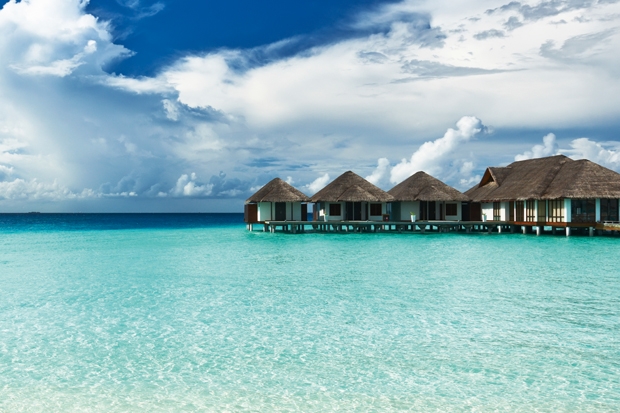Suddenly, the Maldivians are in the news. Earlier this year, they locked up their first democratically elected president, and just recently they declared a state of emergency. It never used to be like this. The Maldives was just a place you saw in brochures, looking expensively turquoise.
It has a population no bigger than Barnet (350,000), and 99 per cent of the country is covered in water. Until recently, even its neighbour, Sri Lanka, hardly seemed to notice it. During my time in Colombo, visiting Maldivians were merely a source of idle curiosity. They flew into town either to pick up a secular education or to get roaring drunk. It did make you wonder what went on at home.
Well, now J.J. Robinson has some of the answers. He describes a society that has always been conservative, and whose variant of Islam is particularly vehement. The country was a British Protectorate from 1887 to 1965 — not that you’d know it. By the end of the 20th century, it had become eerily medieval.
In 1978, Maumoon Gayoom took over, and ran it as his own mini-caliphate for the next 30 years. During his reign, he acquired a $9 million yacht, 55 cars and a golden loo. Meanwhile, his citizens were getting by on an average of $664 a year, and the Maldives became ‘one of the world’s strictest Islamic countries’. Adulterers were flogged (or at least the women were), and a band of thugs, known as ‘Star Force’, kept everyone compliant.
Then something odd happened, and a window of democracy appeared. In 2008, Mohamed Nasheed forced an election and won. Educated at Dauntsey’s in Wiltshire, he’d spent most of his life in jail or banished abroad. During his exile, some old school friends had helped him establish a government-in-exile in a fireplace shop in Salisbury. From here, he made a euphoric return to the Maldives, and for a while all went well. The yacht went on eBay, and Nasheed started weeding out the judges (a quarter of whom had criminal records).
It was a short but glorious interlude, and fortunately Robinson was there to record it all. At the age of 25, he’d flown out to Malé to edit an online paper. I loved this part of the book. His travels have about them a hint of Gulliver. Robinson is a big presence in the tiny capital, and is foreign, untouchable and gauche (before the Maldives, he’d been an IT correspondent, and arrived with a copy of Islam for Dummies). His paper is a ragtail outfit, distributed via a dodgy server (kept under someone’s bed in Singapore). But, despite a beguiling name — Minivan News — it’s soon exposing knavery, and many of its stories end up here.
Maldivians won’t thank Robinson for this portrait, and yet it’s horribly compelling. Apart from a few heroes (including Nasheed), his islanders are invariably ignorant, hot-headed and apt to riot. They regard the beach as their dump, and zealots have smashed most of the pre-Islamic art. But, says Robinson, for all their religiosity, many Maldivians are ‘rampantly promiscuous’ and other people’s spouses are often ‘fair game’. It all sounds like heaven for reporters, and Sodom for everyone else. But is this perception fair, or is Tom Chesshyre’s depiction more balanced in his thoughtful travelogue, Gatecrashing Paradise?
The tone in the second half of Robinson’s book is different, more detached and editorial. With 33 pages of footnotes (most directing us back to the Minivan archives), much of the detail is highly specialist — although there are some intriguing revelations. I particularly liked the one about the Taleban, who meet at the Paradise Island Resort.
Without doubt, however, there’s courage and defiance at the heart of this book. Dark forces are always present and, in February 2012, the news bulletins are suddenly interrupted and replaced with a screening of Beauty and the Beast. It’s the Gayooms again, seizing power. This time, they say, they’re here to ‘defend Islam’ and, before long, Mohamed Nasheed is back in jail. In the ensuing chaos, at least one journalist will pay with his life.
And what are the lessons for the rest of us in this ‘Maldivian Spring’? Easy, says Robinson; whatever happens in the Maldives happens elsewhere a few years later. Whether that’s true or not, this is a sad and salutary tale, boldly told.






Comments